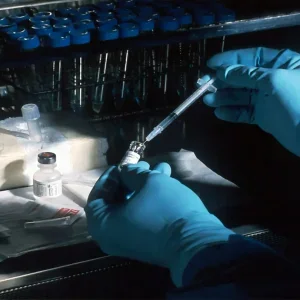US-based biotechnology company Amgen has received the US Food and Drug Administration (FDA) approval for Blincyto (blinatumomab) to treat a type of leukaemia.
The drug is indicated for CD19-positive B-cell precursor acute lymphoblastic leukaemia (B-ALL) in first or second complete remission with minimal residual disease (MRD).
The US health regulator approved the company’s supplemental Biologics License Application (sBLA) for Blincyto, based on additional data from two Phase 3 studies.
The approval converts the accelerated approval for Blincyto, granted in March 2018, to a full regulatory approval in the same indication.
Blincyto is contraindicated in patients with a known hypersensitivity to blinatumomab or to any constituent of the product formulation.
Amgen research and development executive vice president David M Reese said: “We are pleased the FDA has granted full approval for Blincyto, the first FDA-approved CD19-directed CD3 T-cell engager BiTE immunotherapy and the first to be FDA-approved for MRD in 2018.
“Today’s full approval underscores the clinical benefit of Blincyto for people living with B-ALL, and we look forward to exploring how we can continue to make a significant impact for these patients.”
Blincyto is a bispecific T-cell engager (BiTE) immuno-oncology therapy that targets CD19 surface antigens on B cells, to fight cancer.
It helps the body’s immune system to detect and target malignant cells by engaging T cells, a type of white blood cell capable of killing other cells perceived as threats, to cancer cells.
The BiTE immuno-oncology therapies are currently being studied for their potential to treat different tumour types through tumour-specific antigens.
Amgen is currently advancing more than a dozen BiTE molecules across a range of hematologic malignancies and solid tumours.
The US drugmaker plans to continue its Blincyto development, with studies in MRD-negative B-ALL, clinical trials to minimise chemotherapy, and test a subcutaneous formulation.
The clinical trials principal investigator Elias Jabbour said: “In a Phase 2 study, roughly 80% of adult patients treated with blinatumomab experienced a complete MRD response.
“The FDA’s decision to grant a full approval for blinatumomab further validates the use of this therapy to treat adults and children with B-cell precursor ALL with MRD present following a remission, which is a strong predictor of relapse in this patient population.”






